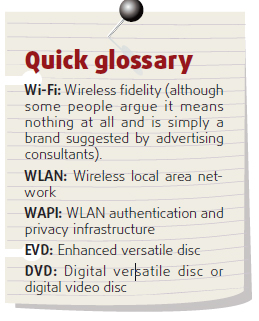Economy
Cell phone puzzle: Imitation, innovation, irritation
By Peng Yining (China Daily)
Updated: 2010-02-23 06:57
 |
Large Medium Small |
"Wi-Fi is a standard developed by foreign countries. What if there was political disagreements between China and them? We need WAPI to protect China's information security," he said.
After WAPI was recognized by the ISO, the Ministry of Industry and Information Technology issued a notice to mobile phone manufacturers allowing them to enable Wi-Fi on handsets if they integrate the homegrown standard.
"WAPI is generally the same as Wi-Fi only with extra security protocols to resolve the existing security loopholes in Wi-Fi," Li Mofang, former chief engineer for China Mobile, the nation's largest telecom operator, told China Daily. "WAPI is the Chinese national standard and is strongly supported by the ministry. However, it still isn't in wide use, even in China."
|
|||
China Unicom, the country's second largest telecom operator and the only one licensed to sell Apple's iconic iPhone, disabled the Wi-Fi on the first batch of handsets but are in talks with the government and hope to enable the function soon, according to a report released on Dec 29 by NetEase, a popular Chinese news portal.
"The Wi-Fi function is only disabled when the phone is imported in China," said Wang Hongbin, who works in research and development at Motorola China, one of the biggest manufacturers of wireless cell phones.

Integrating the standards is cheap and easy because it only needs a software update, said Wang. Motorola last year introduced two types of mobile phones that integrate WAPI and Wi-Fi.
"Manufactures did not suffer through Wi-Fi being disabled, Chinese consumers did. For a long time they didn't have legal access to mobile Wi-Fi. Even now, consumers have to buy a smuggled iPhone if they wanted to use Wi-Fi," he said.
A poll of those who purchased smuggled third-generation (3G) cell phones discovered 58 percent were attracted by the illegal Wi-Fi function, according to a report on Nov 20 last year by Internet Consuming Research Center, which was founded by Zhongguancun Online, one of China's largest online retailers of electronic goods.
Ge Shaochen, a self-confessed Apple fanatic from Beijing, told China Daily he bought an iPhone on the gray market solely because of the Wi-Fi function.
"This is the only smuggled Apple product I have bought. I didn't want one of those 'castrated' iPhones," said the 23-year-old Web designer. "The iPhone has a big screen and was designed to browse the Internet. Why can't Chinese use mobile Wi-Fi like people abroad?"
Instead of collecting his new, sleek cell phone from one of capital's "bright, spacious and exclusive" licensed Apple stores, Ge instead picked up his new gadget at a bustling digital electronics mall in Tianjin, where stalls sell iPhones shipped from abroad, as well as Hong Kong.
"The packing was a little damaged and opened, but it was OK because the seller is a friend of mine. I would only buy the phone from a friend. There are so many fake and refurbished iPhones on the gray market," he said.
"The seller sold it to me in the name of a procurement agent, who purchased the iPhone in the United States. The iPhone with the Wi-Fi function can be bought all over the world, even Hong Kong. Online shops have made getting a complete iPhone easier, too."
The legal models sold by China Unicom since Oct 30 cost from 5,000 to 7,000 yuan ($730 to $1,000). Ge paid 4,500 yuan for his smuggled iPhone 3G. However, it came with no after-sales service or guarantee, nor quality certifications and network entry permits.
"Compared with buying from China Unicom, I paid less and got more functions," he said.
To connect his smuggled phone to a Chinese network, he used software called Prison Break, which costs up to 100 yuan in digital markets across the country.

"This is the risk a mobile Wi-Fi user must take. At least I bought a real iPhone. Disabling Wi-Fi is an insult to the user. What concerns me more is why China disables a function every other country is using? It is unfair," said Ge.
Jiading, a northwestern district of Shanghai, became China's first "wireless city" project on Jan 1, 2008, with plans for up to 300 Wi-Fi networks. Beijing also established a 100-sq-km wireless zone during the 2008 Olympic Games and expanded it to 625 sq km by the end of last year, according to operators CECT-Chinacomm Communications Co Ltd.
"There are more and more devices supporting Wi-Fi, and network coverage is getting larger and larger," said Guo Qiang, founder of Huoju Network, a website promoting wireless Internet connectivity. "I would like to see China release a homegrown standard, but only if it helps the industry's development."
A report launched by the National Institute of Standardization in 2005 divided the nation's technology standards strategy into two steps: until 2010, China would follow international standards and participate in the research; from 2011 to 2020, China would successfully set standards in important fields, including electronics.
"Independent innovation is more a political slogan than real practice," telecoms expert Kan said. "Homegrown intellectual property rights may bring profits for the country but something is only a success if it is accepted by the customers and markets."
WAPI is not China's first shot at adopting and commercializing a new international standard on a global scale.
EVD - China's rival to DVD - was put into development in 1999. A format to play optical discs containing high-definition material, EVD was intended to help Chinese media producers avoid paying 1 billion yuan a year to foreign DVD patent holders for using the technology.
However, EVD fared poorly upon its released in January 2004. Players sold for 1,900 yuan, more than double the cost of a DVD player, while customers were also disappointed to discover they could only enjoy the high-definition picture of EVD with a high-definition television set.
(China Daily 02/23/2010 page7)











